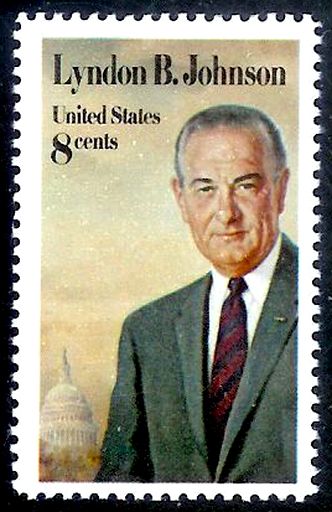 |
| US Postage stamp: LBJ, 1973 issue, 8c (Photo credit: Wikipedia) |
When it comes to politicized churches, it is not clear to me that the IRS now bothers to enforce what I think most of us believe is supposed to happen. That is, when a church crosses the line into politics, they are supposed to lose their tax-exempt status. This is an important part of what the Johnson Amendment was designed to do. But does this actually happen? Was the Mormon church ever in danger of losing their tax-exempt status when it became widely known that they had been funneling money into California to defend the same-sex marriage ban? I don't think so. If there is little enforcement now, would we see a real difference without the Johnson Amendment?
Most of us believe that churches aren't supposed to tell their congregants who to vote for and that this somehow offers some protection against theocracy. But do they really have to tell their congregants how to vote? If I were to tell you that I am a bible-believing Christian who regularly attends a Southern Baptist mega-church in Mississippi, I suspect that you could tell me where I stand on many political issues (e.g., same-sex marriage, reproductive rights, vouchers for religious schools). Do you think it would be necessary for my evangelical fundamentalist Christian pastor to explicitly tell me to vote for the candidate opposed to reproductive rights and contraception instead of the "baby killer" running against him?
If pastors began loudly and explicitly telling their congregants how to vote, I suspect there might even be a backlash. Many Americans are less than thrilled with being told what to do by anyone, and it is difficult to imagine that the parishioners who attend primarily for the perceived social benefits would put up with much of this. I'm not sure how this would play out, but I could imagine churches losing some people if they became too explicit in politicking. It sounds like at least some churches are worried about the same thing.
From what I can tell, the primary reason to be worried about losing the Johnson Amendment has to do with churches and religious organizations funneling dark money to politicians. If the amendment were to fall, churches and other religious organizations could lobby elected officials and contribute to their campaigns just as corporations can after Citizens United. While I'd personally be inclined to allow this on the condition that churches and religious organizations lost their tax exemptions, this does not seem to be in play at the moment. Losing the Johnson Amendment would mean that religious organizations would be free to become thoroughly politicized without any consequences to their tax-exempt status, and this would appear to undermine church-state separation.
Would losing the Johnson Amendment be a bad thing? I believe so. It would be a significant blow to church-state separation, and I think it makes sense that secular groups are opposing it. Would losing it be the end of the world? I'm a bit skeptical that we would notice much difference aside from the potential impact of more dark money entering our political system; however, that seems like a good enough reason to oppose it. If we manage to keep the Johnson Amendment, I'd certainly like to see it enforced far more often than currently appears to be the case.